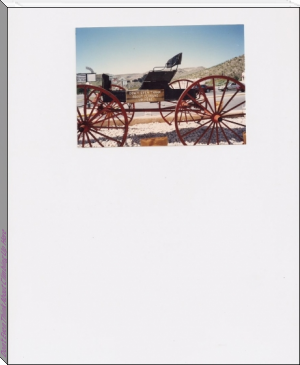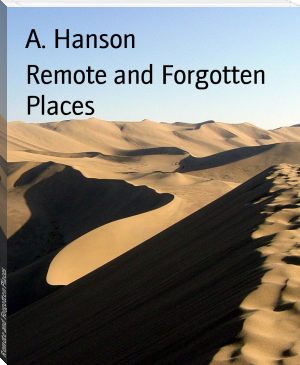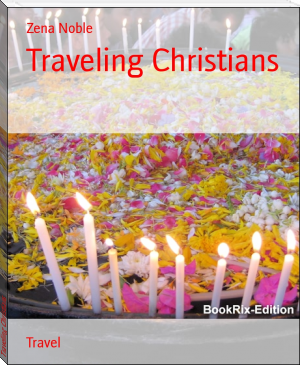Don't Even Think About Climbing Up Here by Elizabeth Towles (e book reader pdf TXT) 📖

- Author: Elizabeth Towles
Book online «Don't Even Think About Climbing Up Here by Elizabeth Towles (e book reader pdf TXT) 📖». Author Elizabeth Towles
DON’T EVEN THINK ABOUT CLIMBING UP HERE
My daughter, she’s to blame. At her prodding, I joined Facebook; you know, 21st century’s electronic version of a personal diary, only now personal translates to public. She sent me emails, daily, telling me to add something...anything, to my home page. True, there were gaping holes of white space, no photos, and no notes written on the Notes link. It was, however, this exacting message, ‘my patience’s wearing thin,’ that finally pushed me into action. Hey Mom—Still waiting to see that map of yours of all the places you’ve been. For tips, check out my travel map site, or check Nancy’s travel site, or check...check...check—Robin.
Okaaay!
I once heard someone say that if he could live his life traveling, he’d gladly give up everything he owned—it wasn’t until I arrived home from my first extended trip that I fully understood such a singular passion.
I have traveled to Hawaii, Canada (Toronto), England (London, Strafford-Upon-Avon), Germany, Austria, Switzerland (Gstaad), where cows are given names and parade through the streets at the end of summer; to Italy, Greece, where on a bathroom visit, I was introduced to my first hole in the floor. I went to Turkey (Ephesus), where the ghosts of early Christians hover in the air and voices, unlike any I’ve heard, tickle my ears; and where public latrines line the walls with only inches separating them as though one's most intimate act was then considered simply a social activity; to Brazil (Rio de Janeiro), where drinking the water will lay you flat out. In 2000, I saw The Passion Play in Oberammergau, tears blurring the eyes of everyone around me; the deep hush was almost touchable. When leaving, only the press of feet grating across the concrete floor broke through the silence. I heard a young violinist play chamber music in Vienna; he made the violin strings sing a new voice.
I took my first big trip with my husband, John, to Rio de Janeiro in January 1968. Suddenly, I owned a passport, new luggage, and a TRAVEL BOOK. I had come of age. I packed days and days ahead of time...still do, occasionally. My husband’s aunt arrived to care for Robin and Scott, our two small children. At sunrise the next day, John and I left for the airport, joining a group of his co-workers and friends in the music industry. I remember the long flight, the food that appeared seemingly on the hour, the laughter, the jokes that circled; and the party mood that started the moment the plane lifted in flight. On our arrival, a tour guide escorted us to the hotel; she pointed out that there were no traffic lights, pedestrians had the right-of-way, and the extra-wide sidewalks in the down-town area allowed cars to pull up directly in front of the stores. Every morning, young children, with old eyes too knowing, gathered on the hotel steps, standing with their hands extended as we exited the hotel. Wealth and poverty, both in the extreme, existed side by side. Sprawling mansions were common sights, also the endless shanty towns that crept up the hillsides unfit for development. On the last day of our visit, a van carried us to the highest part of the city, Corcovado Mountain. At the main entrance, steps, hundreds of them, led going up even farther to the huge statue of CHRIST THE REDEEMER that towers over Rio. When I finally reached the top and stood looking into His face, I knew why millions of people are drawn to this place.
In January, 1990, I went to London with a co-worker, Rosa. It was the week of the war, Desert Storm. We were advised to cancel the trip, but we had booked months in advance and wouldn’t consider it. When we boarded in Charlotte, our plane was less than half-full, as was our connecting flight; the empty seats became prized possessions at night-time. In the most populated business area around London, tall, red, double-decker buses thronged the streets, along with boxy, black taxis that looked like bloated mafia cars; and when inside, the passenger area swallowed our four suitcases with room to spare. We rubbed elbows with royalty...well, almost. We did stay at the Royal Gardens Hotel which is next door to Hyde Park and Kensington Palace; and Prince Charles’s driveway is adjacent to the hotel’s dining room—and we always asked for a window seat...to wave, perhaps. We watched the changing of the guards at Buckingham Palace, and later, had lunch in a pub in Strafford-Upon-Avon. It was the chalk writing-board message near the entrance that enticed us in: Don’t be miserable outside, come in and be fed up! (bad joke, but the food’s good. HONEST). We toured Windsor Castle, and at mid-afternoon, spotted students coming from Eton; each one, from teenaged to very young, dressed in formal attire, black tie and tails. At the end of our days, we sat clothed in a like-wise finery, in the white marble-floored lobby of our hotel, sipping refreshments and listening to music played on a white Grand Piano by a white tuxedoed musician. Our own slice of royalty! We saw Phantom of the Opera in an 800 year-old theatre and were served ice cream at our seats, during intermission. Spoiled we were! But—we were to get our comeuppance! It began when checking in at the airport. Rosa, who is Japanese, was traveling with a green card that carried her Japanese name while her flight ticket showed her American name. She was questioned at length, and released. Then, the mace sprayer on my key chain triggered the metal detector alarm and I was pulled aside. The sprayer was taken. I was asked if I had been traveling with it on the streets while in London, and when I said yes, the police were called. Rosa and I were bodily searched, suitcases meticulously searched; and two hours later, we were escorted to our waiting plane. I was told not to plan on returning to England anytime soon. It’s been 19 years.
My friend, Nancy, and I went out west in mid-summer, 1994; it was an eye opener! At times, I felt in another country, the scenery so vastly different: homes built of unbaked clay brick called adobe, long stretches of bare, uninhabited land, and the exceedingly dry air, thirsting up my mouth. On arrival at Carlsbad Caverns, we were given an option: to walk the two-mile down trail, or take an elevator. With my curiosity already running ahead, I, of course, chose to walk. Again, it seemed I had stepped into another world, one of breathtaking beauty so surreal it topped anything my imagination could envision: bats hanging from nearby lowered areas, the smell of mustiness that clung to my skin, the twists and turns as I moved down into a shadowed hole that led deeper and deeper. And all the while my eyes darted everywhere, sweeping clouds of drapery—Nature induced—colorful minerals, the sounds of dripping water I never saw, and deep ravines on either side of the path that hinted of an unfathomable depth. When I reached a solid floor, it felt the center of earth. And maybe it was.
On the move once more—our bus arrived in White City, New Mexico. Nearby was White Sands, our next stop. Sand dunes as tall as multi-storied buildings charted the landscape, and when climbing up the wall of sand (yes, the sand was indeed WHITE), it shifts and one can mire up quickly. The bus driver said the sand is plowed from the roads every day so that buses can get in and out. After our sand-play, we returned to White City and had lunch at the locally famous eating establishment, the Velvet Garter. We were told to be on the lookout for gunplay going on next door at Fast Jack’s Saloon. Meals went uneaten. We rushed outside—a wagon sat at the ready out front...with a wooden sign that read: Don’t even think about climbing up here. We burst out laughing! At night, the main attraction in this two-block town boasts of having the last remaining vaudeville theatre around, Granny’s Opera House. When I stepped inside the small lobby, I was offered a box of popcorn, I said, "No, thank you, I've already had dinner." She replied, “My dear, this isn't for eating, this is to throw at the performers during the play." Needless to say, my friends and I had a great time trying to see who had the best throwing arm. My mother taught me never to brag!
More memory spikes—1994. Albuquerque topped our list for the day. After a long bus ride that carried us across a vast span of desert-like land, we arrived at Scandia Peak. We rode a tram up toward the clouds to a restaurant with floor-to-ceiling windows, and when looking out, I saw only open space, above and below. The menu displayed no prices, only meal selections: delicacies, decadent desserts, and gourmet dishes to drool over. Our tour guide announced that for this dinner, nothing was off limits. The day slipped quickly into early evening, then into a darkness that hinted of no boundaries. Someone asked the waiter if Captain Kirk was in the building, and if we had been secretly put aboard the space ship, Enterprise—we received sly grins in answer. During the ride back down (a flight through the night), sounds of ohs and ahs circled, chanted as though on cue. We soared with the birds that day—twice. Yet, I welcomed ‘terra firma’ underneath my feet, it felt like home.
While still traveling in New Mexico, Taos was next on the agenda. We arrived at Pueblo Village in mid-morning. For most of our group this was a first visit to an Indian village; we stood quietly looking out at the tiny squat adobe buildings. I was struck by the absence of people, the feel of lean times too often, and a sense of desperation, heavy in the air; even a nearby stream hugged its narrow banks greedily. Stillness held the land as though a hostage caught up in a history that tore at the very seam of freedom. We were allowed to walk only on designated paths. A very old, lone Indian watched as we moved toward him; we were told pictures could be taken with this honored man, their chief. He posed in a long tan leather wrap, his thin white hair fluttering in the gentle breeze; deep lines mapped his darkly bronzed complexion; a black feather rose from a beaded headband tight around his forehead, and moccasin-style boots peeped from the hem of his cloak—his face appeared as though carved in stone; only his eyes moved. He was once the leader of many warriors, spoke with the voice of authority; now, he was the subject of pictures, his lifework reduced to clicks of a camera, and the five dollars given for his time. We boarded our bus, the quietness following us in.
It was a simple sign: a square piece of wood attached to a single pole, the black painted letters uneven, as though put on in haste. I can’t recall where exactly this message was posted as we headed for the hotel, but I remember its words vividly: 50 MILES FROM TOWN, 30 MILES FROM WATER, 2 FEET FROM HELL.
Remaining in New Mexico, we filed out in the soft light of early morning and gathered around the bus to hear our guide announce our day’s plans—Bandelier, Santa Fe’s National Forest. Long, long ago, Anasazi Indians, known as the cliff dwellers, occupied this area. They lived in caves pocketed deep inside the high cliffs and mountains that landmarked





Comments (0)